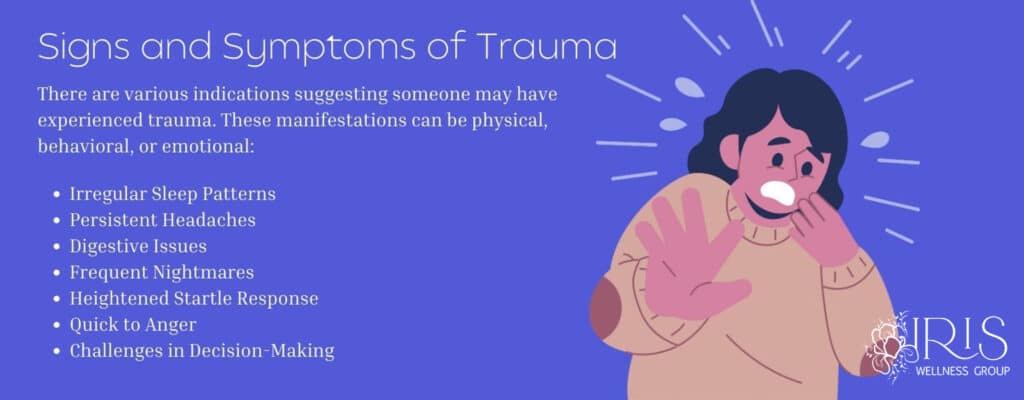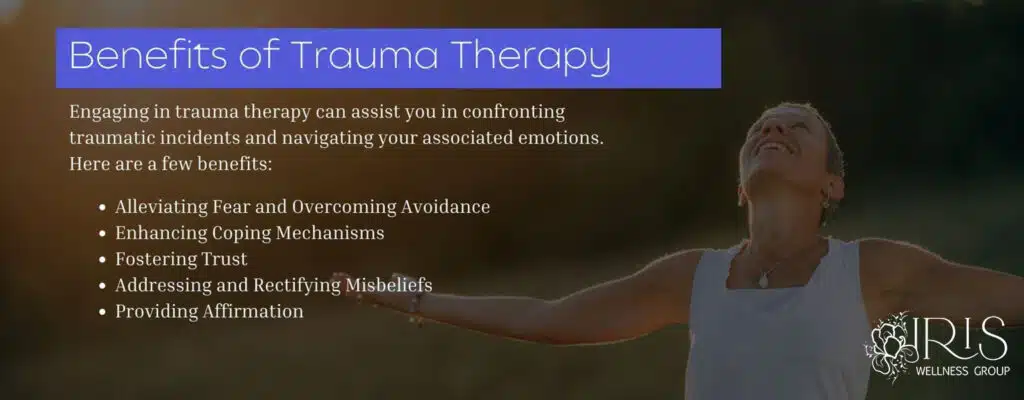Table of Contents
Many people are afraid to relive painful experiences, but trauma therapy requires a surface view of these events and a recognition that you are not defined by your past, nor does your life moving forward need to be dictated by it.
In order to live free of fear and shame, we learn to create that safe space in our lives where we can work through these past experiences without the threat or worry of reliving them. We cannot control what has already happened to us. What we try to teach through our trauma therapy at Iris Wellness Group is that we have to disassociate from the hold we have allowed this trauma to take on our lives.
We don’t expect or wish for our clients to forget the past to move forward, but we do want them to have a healthy relationship with their experiences. Many of our clients involved in one-on-one therapy with a dedicated counselor are often unaware they have past trauma. It’s our job to work comfortably through these past experiences, to touch on the significance they have had in our clients’ lives, and how to understand their impact on their current behaviors.
Many different types of trauma can come from interactions with family members in childhood and adult experiences that have compromised the safe space we have created for ourselves. As we grow and develop into our personalities and habits, these experiences can get in the way of healthy progress. These events can either inhibit personal growth or cause some to build resilience to certain situations. Instability in the family and home is often the root cause of these issues in children, but trauma can come from any number of experiences, such as active combat, grief, sexual abuse as a child or adult, problems at school, and domestic violence, to name a few. These interior struggles can be addressed with trauma therapy at Iris Wellness Group.
What is Trauma Therapy?
Trauma therapy addresses the emotional and psychological effects stemming from traumatic experiences. These events can range from recent incidents to distant childhood memories. It’s not uncommon for individuals to suppress or deny their trauma due to overwhelming shame or guilt, even when it’s not their fault.
Common traumatic events include:
- Sexual, physical, and emotional abuse
- Domestic violence
- Acts of violence by unknown individuals
- Bullying
- Natural catastrophes like earthquakes or hurricanes
- Childhood neglect
- Military service experiences
- Loss of a loved one
- Chronic illness
- Relationship breakdowns, including divorce
Seeking trauma therapy in Chattanooga, TN can assist individuals in recognizing and validating their experiences. Subsequently, a tailored therapeutic approach helps them navigate and heal from their trauma. Call us today at 423-564-6114.

Signs and Symptoms of Trauma
There are various indications suggesting someone may have experienced trauma. These manifestations can be physical, behavioral, or emotional:
- Irregular sleep patterns, either oversleeping or insomnia
- Persistent headaches
- Experiencing nausea or episodes of vomiting
- Digestive issues
- Generalized body discomfort or pain
- Frequent nightmares
- Heightened startle response
- Quick to anger
- Challenges in decision-making or cognitive processes
- Tendency to avoid individuals or locations linked to the traumatic event
On the emotional spectrum, individuals might battle anxiety, undergo panic attacks, or face depressive episodes. Recurring flashbacks are another common symptom. Some might grapple with thoughts of self-harm or even attempt it. There’s also a tendency for some to resort to substance abuse as a means of self-coping. If you or someone you know is grappling with the aftermath of trauma, the dedicated and empathetic team at Iris Wellness Group in Tennessee can offer guidance and support, call us today at 423-564-6114.
Types of Trauma Therapy in Chattanooga
Many types of treatment are available as part of trauma therapy in Chattanooga, TN. Among these is individual therapy, where individuals engage directly with therapists specialized in trauma care. Group therapy is also prevalent, offering a supportive environment for those affected by trauma to share their experiences.
Holistic therapy, emphasizing the collective healing of mind, body, and spirit, is a crucial component. Many grappling with trauma have found this approach transformative. Simultaneously, medication-assisted therapy melds the careful use of pertinent medications with trauma recovery techniques. Given the ripple effect of trauma on families, family therapy is also often recommended as a pathway to collective healing.
A range of specialized therapeutic techniques is employed to address trauma and its aftermath. Workman highlights several methods tailored for trauma recovery and PTSD:
- Prolonged Exposure (PE): A technique focusing on gradual exposure to the trauma source until fear diminishes.
- Cognitive Processing Therapy (CPT): A method that challenges one’s perceptions about the traumatic event and the subsequent beliefs. It can be applied individually or in groups.
- Trauma-focused Cognitive Behavior Therapy (TF-CBT): Specifically designed for children and adolescents, it rectifies misbeliefs and counterproductive behavior patterns.
- Eye Movement Desensitization and Reprocessing (EMDR): This therapy uses rhythmic bilateral stimulation to help unblock trauma-entrapped emotions.
Begin Your Journey Towards Healing With Our Trauma Therapy Experts.
What’s The Connection Between Trauma And Addiction?
Symptoms arising from trauma can sometimes pave the way for addiction. Treating the root trauma can be pivotal in addressing the core issue.
For instance, military personnel grappling with Post-Traumatic Stress Disorder (PTSD) have an elevated risk of resorting to drugs or alcohol due to their traumatic experiences. Integrating trauma treatment with traditional substance abuse interventions has proven to expedite and enhance patient recovery. Addressing the root causes of substance abuse through trauma therapy can reduce chances of relapse, facilitating comprehensive healing.
Individuals grappling with post-traumatic stress disorder (PTSD) might resort to abusing drugs, alcohol, or prescription medications. As untreated trauma prolongs, the descent into substance dependency deepens, sometimes leading to withdrawal symptoms during abstinence attempts.
Indicators of a profound addiction problem encompass:
- An inability to abstain from drugs or alcohol
- A growing tolerance requiring more substance for the same effect
- Forgoing once-valued activities
- Prioritizing substance acquisition over essential relationships
Those battling both trauma and substance use disorders often face challenges in their personal relationships. They might indulge in risky behaviors like driving under the influence, leading to legal complications following arrest for actions committed while intoxicated. Engaging in trauma-focused therapy can empower individuals to handle their struggles without resorting to substance use.
How Substance Abuse Affects Trauma Symptoms
After experiencing a traumatic event, individuals may be diagnosed with acute stress disorder (ASD). Those with ASD might feel a sense of unreality about their surroundings or feel detached from others. Persistent intrusive memories or thoughts of the traumatic event are common. If ASD symptoms persist beyond a month, it often transitions into a PTSD diagnosis.
Drugs and alcohol can be tempting as they might offer temporary relief from trauma’s overwhelming effects. Such relief can lead to emotional numbness, increased social withdrawal, and heightened feelings of anger and depression. Relying on substances as a coping mechanism frequently paves the way to addiction, impacting the person’s capacity to function effectively.
It’s not uncommon for adults with both PTSD and substance use disorders to also have other underlying mental health challenges. Those seeking trauma-informed addiction treatment may also be diagnosed with conditions like:
- Attention-deficit hyperactivity disorder (ADHD)
- Depression
- Anxiety
- Obsessive-compulsive disorder (OCD)
- Personality disorders
Engaging in a trauma-focused substance abuse treatment program offers individuals strategies to manage both the physical and psychological repercussions of their trauma.
Getting Treatment for Trauma and Addiction
Effectively addressing substance dependency generally necessitates expert intervention. Iris Wellness Group extends support for those in search of trauma-informed addiction programs in Tennessee. Participating in a trauma-centric addiction program grants access to tailored care, steering individuals away from substance reliance.
Clients deeply entrenched in substance dependence may first undergo our detoxification programs. Subsequently, our medical professionals curate trauma-sensitive addiction treatment plans tailored to individual needs. Available services within our Tennessee trauma addiction program include:

Benefits of Trauma Therapy
Engaging in trauma therapy can assist you in confronting traumatic incidents and navigating your associated emotions. It offers a secure environment to tackle fears and acquire coping strategies essential for daily life.
Alleviating Fear and Overcoming Avoidance
Traumatic events can foster fear, making you shun triggers or reminders of the experience. For example, someone in a freeway car accident might avoid highways or even fear car rides, notes Workman.
Trauma therapy can encourage facing and addressing these deep-rooted fears, says Workman.
Enhancing Coping Mechanisms
Workman highlights that trauma or PTSD often persists due to detrimental beliefs like “I can’t handle this.” Therapy can bolster your confidence and coping tactics.
Fostering Trust
Experiencing trauma can shatter your sense of security, making trusting others challenging.
Through therapy, a belief such as “Trusting anyone is risky” can evolve into “Though I was harmed before, many are kind and deserving of trust,” Workman suggests.
Addressing and Rectifying Misbeliefs
Therapeutic sessions can challenge and correct misconceptions formed post-trauma about oneself and one’s surroundings, aiding in understanding the reasons behind the traumatic event, explains Workman.
For instance, instead of thinking, “Bad occurrences imply I’m at fault,” one might learn “Unfortunate events can befall anyone without it being their fault. My worth remains intact irrespective of the adversity faced.”
Workman emphasizes therapy’s potential to debunk false beliefs, foster fresh perspectives about traumatic events, and alleviate trauma-associated feelings, such as guilt and shame.
Providing Affirmation
Workman states that survivors often face further distress when their trauma is invalidated or when they’re reprimanded post-disclosure, leading to chronic struggles.
Therapeutic interventions can affirm your experiences, granting the compassion and acknowledgment vital for the healing journey.
Trauma Therapy in Chattanooga, Tennessee
Experiencing trauma, whether recent or in the distant past, can significantly affect one’s life. At Iris Wellness Group, we offer specialized treatments to address both the aftermath of trauma and potential substance dependencies. Our trauma therapy program in Chattanooga, TN is tailored to your unique needs, aiming to foster mental and physical well-being. Supported by a team of experts, we employ proven strategies to facilitate recovery in a focused, distraction-free environment.
Call us today at 423-564-6114 to understand our admissions procedure and embark on your journey to healing from trauma.









